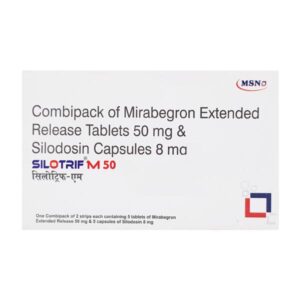SILODOSIN + MIRABEGRON
Silodosin: Silodosin is a medication that is classified as an alpha-blocker. It is primarily used to treat the symptoms of benign prostatic hyperplasia (BPH), which is an enlargement of the prostate gland in men.
The exact mechanism of action of Silodosin is not fully understood, but it is believed to work by relaxing the smooth muscles in the bladder and prostate. This helps to improve urine flow and reduce the symptoms associated with BPH, such as increased urinary frequency, urgency, and difficulty in starting or stopping urination.
The recommended dose of Silodosin for BPH is usually 8 mg orally once daily. It is important to take the medication as directed by a healthcare professional and to follow the prescribed dosage.
Like any medication, Silodosin can cause side effects. Some common side effects of Silodosin may include dizziness, headache, nasal congestion, runny nose, diarrhea, and abnormal ejaculation. These side effects are usually mild and transient. However, if they persist or worsen, it is important to seek medical attention.
Silodosin may also cause orthostatic hypotension, which is a drop in blood pressure upon standing up. This can cause dizziness or fainting. Patients taking Silodosin should be cautious when standing up quickly or getting out of bed.
In some rare cases, Silodosin can cause more serious side effects such as priapism (prolonged and painful erection), vision changes, and allergic reactions. If any of these occur, immediate medical attention should be sought.
It is important to note that Silodosin may interact with other medications, so it is essential to inform your healthcare provider of all the medications, supplements, and herbal products you are taking before starting Silodosin.
In conclusion, Silodosin is an alpha-blocker medication used to treat the symptoms of BPH. It works by relaxing the smooth muscles in the bladder and prostate, improving urine flow. It is generally well-tolerated, but can cause some side effects such as dizziness, headache, and abnormal ejaculation. It is crucial to take Silodosin as prescribed and to be aware of any potential interactions or serious side effects.
Mirabegron: Mirabegron is a medication used to treat overactive bladder (OAB). OAB is a condition characterized by frequent urinary urgency, increased frequency of urination, and in some cases, urinary incontinence.
The mechanism of action of Mirabegron involves activating beta-3 adrenergic receptors located in the bladder. By stimulating these receptors, Mirabegron relaxes the smooth muscle of the bladder, which helps increase the bladder’s capacity to hold urine and reduces episodes of urinary urgency and frequency.
The recommended starting dose of Mirabegron is usually 25 mg once daily. Depending on individual response and tolerability, the dose can be increased to 50 mg once daily after 8 weeks. It is essential to follow the dosage instructions provided by the prescribing healthcare professional.
While Mirabegron is generally well-tolerated, it may cause some side effects. Common side effects include hypertension (high blood pressure), headache, urinary tract infection, nasopharyngitis (inflammation of the nasal passages and throat), constipation, and diarrhea. Less frequently reported side effects include increased heart rate, dry mouth, nausea, and dizziness.
It is important to note that Mirabegron may interact with other medications, especially those metabolized by certain liver enzymes. Therefore, it is crucial to inform the healthcare provider about all medications, including over-the-counter drugs and supplements, before starting Mirabegron.
Overall, Mirabegron can be an effective treatment option for individuals with overactive bladder when used as directed by a healthcare professional. However, it is important to discuss potential risks and benefits with a medical professional before starting this medication.

